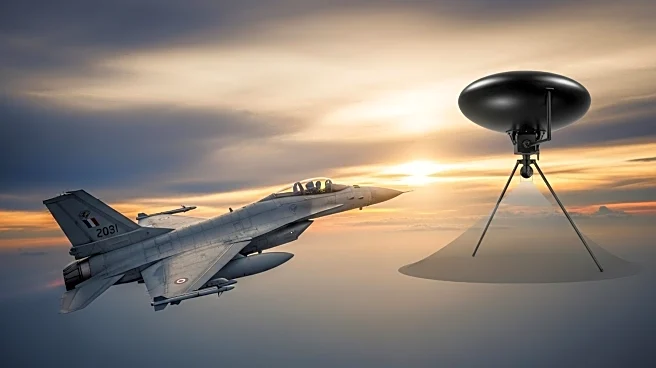What's Happening?
Poland, along with its NATO allies, successfully intercepted Russian drones that breached its airspace during aerial assaults against Ukraine. Prime Minister Donald Tusk highlighted the seriousness of the situation, noting that numerous drones posed a direct threat and were neutralized. Defense Minister Władysław Kosiniak-Kamysz reported that over ten unidentified objects entered Polish airspace, with those deemed a risk to national security being effectively engaged. NATO Air Command and the Royal Netherlands Air and Space Force supported Poland with F-35 fighter jets. Warsaw's Chopin Airport suspended operations due to airspace closure, affecting travel plans. EU foreign policy chief Kaja Kallas condemned the drone incursions as a deliberate act by Russia, calling it the most serious violation of European airspace since the war began.
Why It's Important?
The interception of Russian drones by Poland and NATO allies underscores the escalating tensions in Eastern Europe amid the ongoing Ukraine conflict. This incident highlights the vulnerability of European airspace and the potential for further military confrontations. The EU's solidarity with Poland and calls for increased support for Ukraine reflect the broader geopolitical stakes involved. Strengthening Europe's defense capabilities is crucial in countering Russian hostilities, which continue to pose threats to regional stability. The incident also impacts civilian life, as seen with the temporary suspension of operations at Warsaw's Chopin Airport, illustrating the broader societal disruptions caused by military activities.
What's Next?
Polish military authorities are searching for potential crash sites of the intercepted drones and advising the public to avoid debris due to safety concerns. The EU is likely to continue advocating for increased defense measures and support for Ukraine. The ongoing military exercises between Russian and Belarusian forces, known as 'Zapad 2025,' may further heighten tensions in the region, prompting neighboring countries to bolster their defense readiness. The situation remains fluid, with potential diplomatic and military responses from NATO and EU member states.
Beyond the Headlines
The drone incursions raise ethical and legal questions about airspace sovereignty and the rules of engagement in conflict zones. The incident may lead to discussions on international law regarding aerial surveillance and military interventions. Long-term implications include the potential for increased militarization of Eastern Europe and shifts in defense policies among EU and NATO countries.










